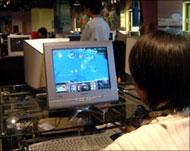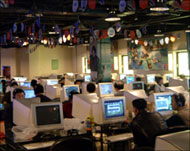Chinese bond with internet games
Eyes glued to the screen, 15-year-old Wang Li is mesmerised as his assembled army masses for what will prove to be the final attack.

Playing Starcraft, a popular sci-fi strategy game, Wang Li is quite literally joining millions of other fans for an afternoon of internet gaming.
Last year boasting 13.8 million gamers (non-official figures go as high as 19 million), China is one of the largest markets for internet games.
And in a country where diverse forms of entertainment can be quite limited, online gaming is currently king.
“Even in the country’s provincial towns you find high tech internet cafes,” explained Robert Vernick, managing director of a gaming promotion company.
“In a high tier city like Beijing or Shanghai, the average cafe has several hundred computers and will take in around $1000 a day – computer gaming is big business.”
Perfectly natural
Whereas in some places, spending hours each day blowing your virtual enemies to smithereens might earn you some disdainful looks, here it is considered perfectly natural.
“During the holidays, I come here everyday with at least two or three friends,” said one teenage boy while at the same time busy organising his medieval knights into an attack formation. “It is how we spend our free time together.”
On average, an hour of gaming will cost about less than half a dollar making it a cheap form of entertainment. The trick according to Internet bar owner Si Chaoming is to have games that will get people coming back.
At his cafe in central Beijing, over one million dollars has been spent on designing an interactive environment complete with pod gaming zones where players sit facing each other.
“We have over 500 computers in here – it is an intensely social environment,” he said.
Real money is made
 |
|
Cyber gaming is expected to be |
Turning up to play, gamers can either join with other players inside the cafe or unleash upon each other their marauding armies, or more likely, they will take part in a China wide Internet based campaign.
This according to Vernick is where the real money is made.
While games played within a cafe are usually installed onto computers from pirated disks, playing an internet game requires logging onto a server, which in turn requires a password.
Players are thereby forced to buy game specific cards with the money going straight back into the industry.
Although relatively inexpensive, the volume of players is what excites the business. Last year’s official estimate of 13.8 million users is expected to grow to as high as 48 million by 2005.
“The potential is huge,” exclaimed Si. Only open for six months, he is already eyeing up opportunities to begin another bar, adding, “We are ready to go with the investment, I just have not found a suitable location yet.”
According to industry figures, the online gaming market was worth $500 million last year and is projected to grow to two to three billion dollars by 2006.
“Top games can earn up to a one million dollars in profit a month,” added Vernick. Not surprisingly, the industry is attracting attention from major players.
Blade Online
|
“Even in the country’s provincial towns you find high tech Internet cafes. In a high tier city like Beijing or Shanghai, the average cafe has several hundred computers and will take in around $1000 a day – computer gaming is big business” Robert Vernick, |
Fresh from their headline grabbing multimillion-dollar New York stock market flotation, Chinese web portal Sohu.com is now eyeing up the gaming market as the next key area for their portfolio.
According to company director Caroline Straathof, Sohu is about to launch its first major product, Blade Online.
Yet, to make money, the game needs to attract large numbers of concurrent users. Five thousand concurrent users is the number estimated to be the break-even point, 10,000 and the game will start to catch the attention of gaming fanatics.
At present, the most popular game, a fantasy role-playing scenario called Legend of Mir in which humans take on apes in a battle for survival has upwards of 200,000 simultaneous users. At peak times, this can be as high as 600,000 users.
Local market
Eyes have also been turning from across the Pacific. Two years ago, Everquest, a popular US fantasy game entered the market but despite spending sizeable amounts of money on advertising, it failed.
“The market here is very local,” explained Michael Tong, game operation manager at Netease, a game design company. “The problem with Everquest was that they did not localise, they did not adjust to Chinese tastes.”
In addition to making an obvious change in language, gaming in China is far more interactive than in the US or Europe. One reason it is so popular is that playing games provides an outlet for people to communicate and make friends across cyberspace.
“When I first started playing Legend [another fantasy-based game]I joined together with my online friends. They helped me understand the game and we bonded together as a team,” recollected Wang Yuan, a former gaming fan.
“When we had had enough of one game we would all move together to a new one, even though I never met them it felt like we were close friends,” he added.
Humane interaction
 |
|
Gaming in China is more interactive |
In China, there are also games that focus specifically on the bonding aspect of online communication. Nicknamed Q-bans (after the word cute), these products are principally aimed at the female audience who make up 25% of online gamers.
Sometimes action packed (but without gratuitous violence) these scenarios allow for more humane interaction of players including online dating and even online marriage.
Still a relatively new phenomenon, the full effects of gaming have yet to be felt.
Recently upgraded to official sport status by the All China Sports Federation, there are now regular TV shows and international competitions in which celebrity gamers have each move carefully analysed by an attentive public.
There is even talk of online gaming becoming an Olympic Sport at the Beijing Games in 2008.
Urban legends
However, urban legends are rife regarding tales of gaming addiction.
Players commonly complain of dehydration after hours of intense focus in front of a flicking screen without a break.
One recent report in the China Daily told of a boy who collapsed after four days of continuous gaming and deaths have even been whispered about but never confirmed.
|
“We do monitor our gaming servers and occasional place someone in our virtual prison for using offensive language, but very rarely do we come across people discussing political or social issues. People playing games are there for the game” Michael Tong, |
In one bar, 32-year-old bank manager Wang Yong had no qualms about saying that online gaming was “his life”.
Leaving the office at 5pm, he proceeds to spend up to five hours each day and longer at the weekend glued to the screen.
Online addiction has even been cited in court as grounds for divorce and the government recently made moves to ban Internet cafes from being within 200m of a school gate citing “harmful cultural information”.
But Michael Tong dismissed the question of using the online chatting function for anything other than discussing gaming tactics.
“We do monitor our gaming servers and occasional place someone in our virtual prison for using offensive language, but very rarely do we come across people discussing political or social issues. People playing games are there for the game,” he said.
According to Si, his bar receives about eighty addicts a day, ostensibly teenagers who come for periods of at least four hours, seven days a week.
Shaking his head in bemusement he confessed that he did not play himself, as it would be bad for his health.